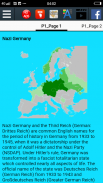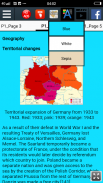








History of Nazi Germany

Mô tả của History of Nazi Germany
Nazi Germany and the Third Reich (German: Drittes Reich) are common English names for the period of history in Germany from 1933 to 1945, when it was a dictatorship under the control of Adolf Hitler and the Nazi Party (NSDAP). Under Hitler's rule, Germany was transformed into a fascist totalitarian state which controlled nearly all aspects of life. The official name of the state was Deutsches Reich (German Reich) from 1933 to 1943 and Großdeutsches Reich (Greater German Reich) from 1943 to 1945. Nazi Germany ceased to exist after the Allied Forces defeated Germany in May 1945, ending World War II in Europe.
Hitler was appointed Chancellor of Germany by the President of the Weimar Republic Paul von Hindenburg on 30 January 1933. The Nazi Party then began to eliminate all political opposition and consolidate its power. Hindenburg died on 2 August 1934, and Hitler became dictator of Germany by merging the powers and offices of the Chancellery and Presidency. A national referendum held 19 August 1934 confirmed Hitler as sole Führer (leader) of Germany. All power was centralised in Hitler's hands, and his word became above all laws. The government was not a coordinated, co-operating body, but a collection of factions struggling for power and Hitler's favour. In the midst of the Great Depression, the Nazis restored economic stability and ended mass unemployment using heavy military spending and a mixed economy. Extensive public works were undertaken, including the construction of Autobahnen (high speed highways). The return to economic stability boosted the regime's popularity.

























